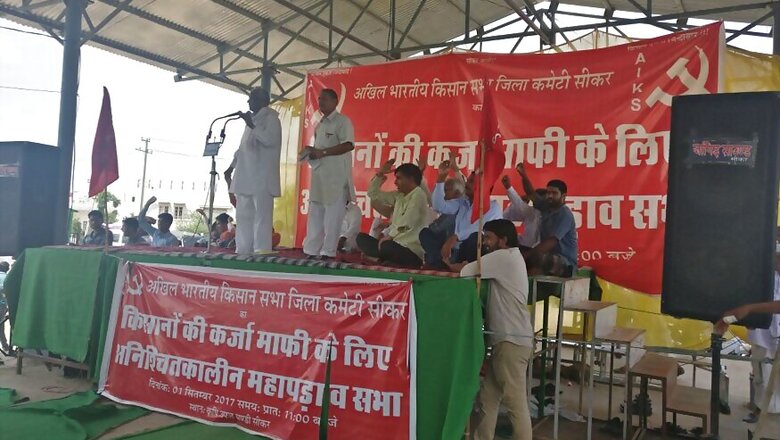
views
Sikar, Rajasthan: The ongoing farmer agitation in Rajasthan’s Sikar district witnessed dramatic scenes on Monday as agitating farmers came face-to-face with the police near the District Collectorate.
Around noon on Monday, the farmers decided to set off on a march to “seize the Collectorate” but after walking around 5 km, they ran into barricades set up by Rajasthan Police.
The district administration has suspended mobile internet services, in addition to suspending WiFi and broadband internet. Section 144 has been imposed in the district. Police had cordoned off the Collectorate and barricaded the road leading up the premises.
Farmers walked from the mandi to the barricades outside the Collectorate, where they came face-to-face with the police. The mood at the protests, however, was festive. DJ vans, brought by agitating farmers, blared music as farmers danced in protest. Political speeches were delivered and poetry was recited even as the standoff continued.
Over the last 10 days, an agitation is being held at the farmer mandi of the district headquarters here. But what is different this time is the scale of the protest, and who all are turning up for the demonstration.
Nearly every section that constitutes the socio-political economy of Sikar district has turned up to lend support to what had started as a farmer protest, be it students, anganwadi workers, the city bus union, the autorickshaw union, the small traders association, pump set workers and so on.
On Saturday, even the local DJs in Sikar dropped in. Forty SUVs, each one loaded with a high-end sound system blasting away at full volume, arrived in an ear splitting procession. On any given day, nearly 10-20,000 people, and on at least two occasions, close to 1.5 lakh people marched in solidarity with the farmers.
Over the last year, the prices of agricultural commodities have all but collapsed. What farmers get for their produce is well below their cost of production, leaving them no option but to borrow from banks or money lenders. The failure to get remunerative prices for wheat, vegetables, milk and other agricultural commodities merely perpetuates the vicious cycle of debt.
When farmers' income collapses, the sections that have close economic ties to them also suffer. The agricultural sector in India employs nearly 60% of the population. In an agricultural district like Sikar, this number would be higher. Simply put, everyone here is connected to a farming family.




















Comments
0 comment